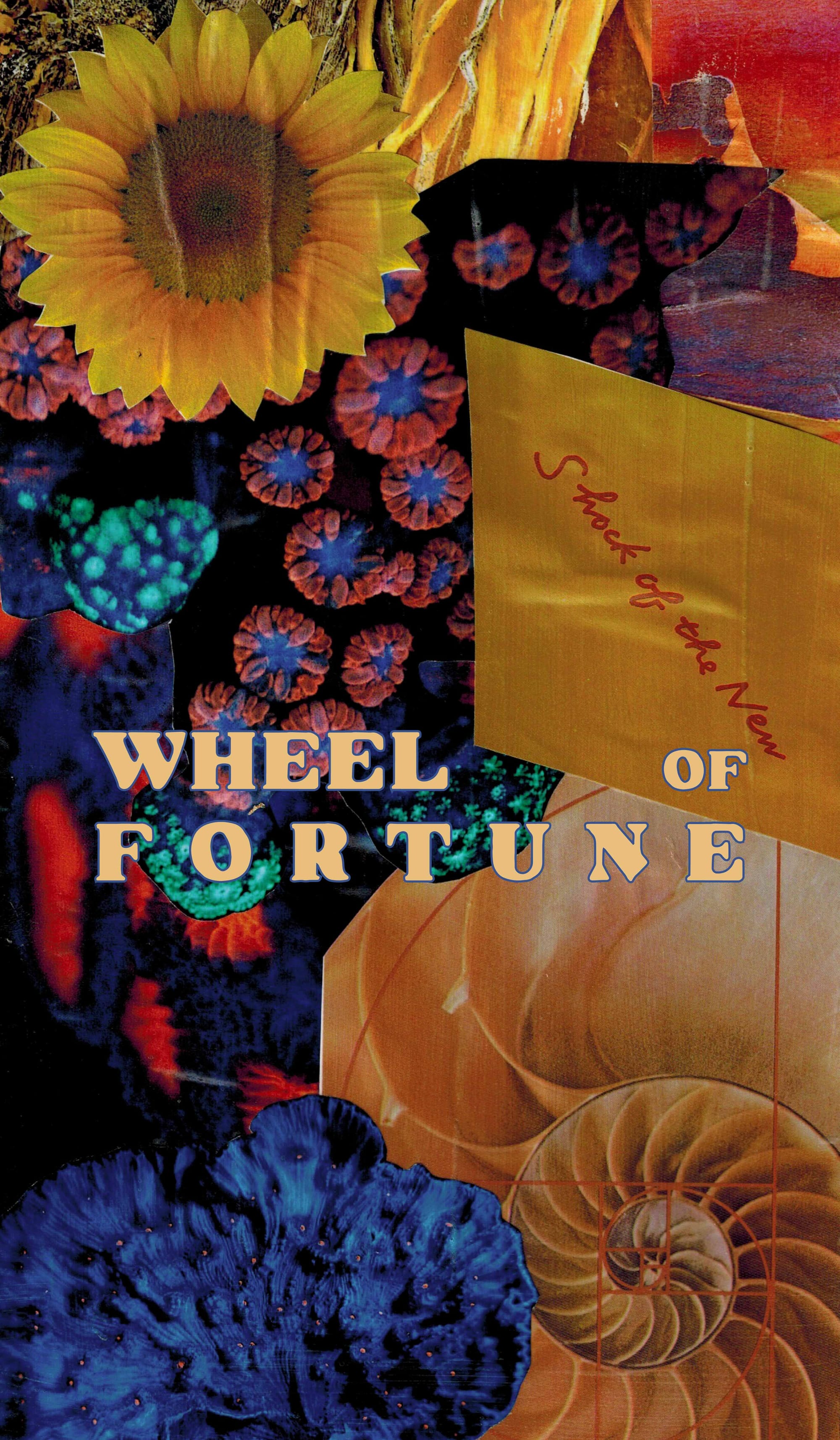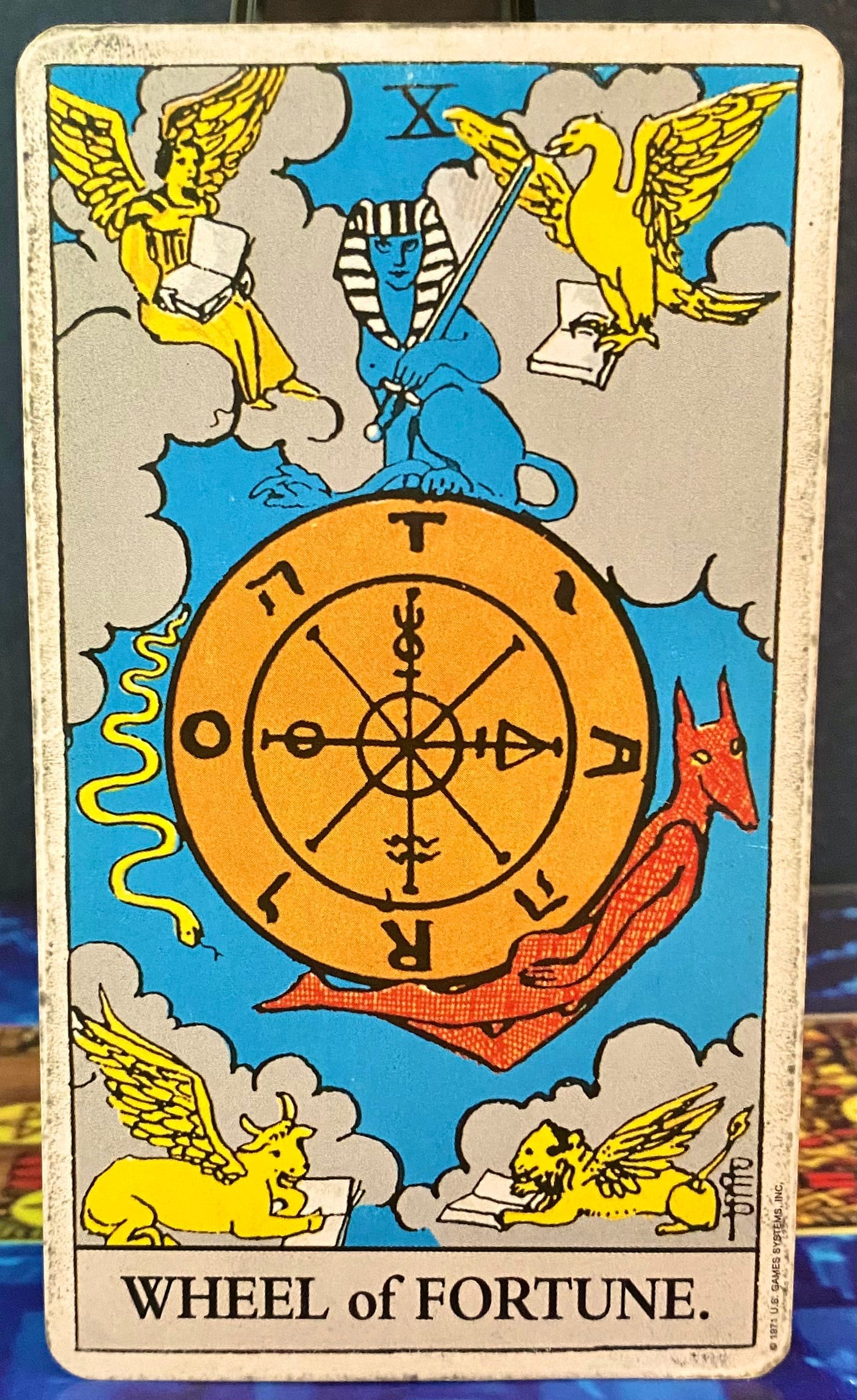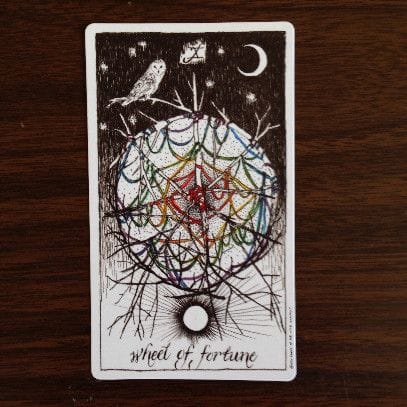Wheel of Fortune
Is change possible? Are we capable of growth? Are we the product of our upbringing, the miracle of our birth, the circumstances of our families, a collection of our petty or significant traumas?

Destiny, fate, change, cycles, seasons, karma.
“All that you touch
You Change.
All that you Change
Changes you.
The only lasting truth
is Change.
God
is Change.”
― Octavia E. Butler, Parable of the Sower
THE WHEEL OF FORTUNE PLAYLIST
I am sixteen years old and walking with certainty and excitement toward my dorm room from an English class that has blown my mind. The air is crisp, a seasonal blend of cut grass and leaves about to fall, like a lab-created scent called “in between.” The path from the classroom to my dorm room is made of bricks, student’s names carved by machine onto each one. One day my name will live here on a brick. In these teenaged days, I can feel my brain learning. It’s an expansive feeling, an intoxicating arousal of self. I feel clear-eyed, cunning, and creative, alliterative and full of promise.
I am capable of not just anything, but everything.
My teacher, one of the first male teachers I’ve ever had, is pushing me. He's not interested in any of my bullshit, and unlike almost every teacher I've had up until this point, I do not have him fooled. At first, it is an affront. In my old school, our grades are posted next to an anonymous long string of numbers (though all of my friends know each other’s ID number so we can keep track of each other’s rankings on the list). My friend, Leila, and I, compete to see which one of us is “winning” English class by what decimal of a point. One day Leila has a 99.6 and I have a 99.7. The next day, I have fallen two tenths of a decimal point and am now in second place.
My new boarding school has a completely different system for grading, where the numbers range from 1 to 6. A 6 is not a real possibility, and certainly not in English class where everything is subjective. One could get a 6 on a math test, I suppose, if one got every single answer correct, but I do not excel at objective subjects with clear answers. The grading scale is a way to upset grade inflation and it works. My new man-teacher is very hard on me. I am used to acing English without trying. He gives me a 3 on a piece of writing, which is essentially a C, and writes “this is barely English” in the margins. At first I am devastated and enraged, then I am activated and desperate to please. Today I’ve said something smart in class, written something good, and my man-teacher is happy with me. I skip from the classroom high on the feeling that I am changing, expanding, that I’ve reached a new dimension and I’m pushing through it.
I am twenty-two years old and living in Park Slope with my boyfriend. I go grocery shopping and set mouse traps and paint walls and own a couch that has a button that releases a footrest. I cook steak on a frying pan and then nuke it in the microwave for thirty seconds with a piece of American cheese on top. I am the nanny to a nine-year-old South African boy who’s parents are human rights lawyers. I write plays, cook meals, get paid. I’m a grown-up, a responsible member of society. This is a new dimension.
There is a gym down the block from my building. I ask my parents for a gift of twelve sessions with a trainer (a generous gift that I could not afford on my part-time nannying paycheck). The gym is having a contest. Whoever loses the most weight in a month will win twelve additional training sessions for free. I have decided that I will be the winner. I lift and run and bend and stretch and jump and starve for the summer and I do, indeed, win the training sessions. The sense of accomplishment is exhilarating. The clothes I can now wear make me feel like a different person, a slinky person, a young temptress, an appealing woman.
In my thirties, I try meditation, charting my progress in an app on my phone. I write in my journals that I can feel it working, that I’m healing old wounds and forging new neural pathways, learning patience.
Every January, I excavate my closets and organize drawers and the feeling of newness it gives me calms the constant rumble in the back of my skull, the thrum of anxiety I’ve lived with all my life.
In the lead up to the 2016 election, my coping strategy is hair color, first lavender, then short and bleached blond. I convince myself that if I look fierce, I will be fierce. When Trump wins, I’m sitting on my couch next to an untouched plate of sugar cookies I’ve made that say ‘Hillary Fucking Clinton." My bleach blonde hair has not saved me from the holy terror that has overtaken my body. I get the word “unruly” tattooed on my arm, but I do not feel unruly. I feel fuzzy, tired, and sad.

Recently, I’m sitting with Gloria, my dietician slash hygge guru, who is helping me work through a lifetime of terrible ideas about food and my body. I’m telling her that I had been feeling so good, so motivated, so excited, but lately, I’ve returned to a feeling of despair. Cruelty and menace have crept back into my inner monologue, and I don’t understand why.
Gloria calls this “the field of flowers.” She says that after years of restriction, many of her clients describe this “field of flowers,” the sense of endless possibility, a kind of euphoric freedom after years of punishment and rules. She explains that the field of flowers wears off eventually and we have to get down to the messy work of every day living.
I realize that I live in constant pursuit of the field of flowers, the manic clarity of the thought everything is about to change, the powerful feeling that my life is in my hands. But I am a creature of cycles, and the reluctant owner of a chemically imbalanced brain. My life is speckled with moments of darkness, stretches of time that feel hopeless and endless. For every moment I’ve skipped down a boarding school path imagining the snaking rivers of my brain expanding and forging new territory, there are an equal number of sleepless nights staring at the ceiling terrified that the world is about to end. For every weight loss contest won, there are months where food and alcohol are my only solace and my feelings of worthlessness mix with my desire to fill the cavernous need in my body with something anything everything.
When Trump wins the election, I careen off the bleached blonde cliff of my creation into a dark void of nothingness. I watch my daughter order “strawbreeze” and “old eggs” from the grocer on her toy phone and I smile with my mouth but my eyes are frozen. I feel nothing. Someone has dumped napalm on my field of flowers.
A few months ago, my friend Justin asked me nonchalantly if I thought I might be focusing too much on self-improvement. At some point, would it be enough? At what point would I feel sufficiently improved?
A week ago, my husband asked me if I really believed people were capable of change. I was floored by the question. I haven’t had a drink in over two years. Three years ago, I couldn’t see a future where that was even remotely possible. “Of course people are capable of change,” I said, “I quit drinking.” Zack points out that quitting drinking creates change because it’s a paradigm shift, a big action that can be taken. But once the euphoria of sobriety wears off, you still have to keep on living as yourself. Smaller, subtler changes (like the voice in your own head) are much harder to shift, and even enormous actions — like moving across the country, getting married, having a baby, or quitting drinking — are not enough to change the story playing in the background of your head all the time.
Everywhere you go, there you are.
These days, I’m waffling. The tides have turned and shame comes creeping. My husband (also a writer) and I are crawling out from under the (very necessary, very justified, but still painful) WGA strike. I was sick for a few days and couldn’t exercise, which sends me spiraling into the pits of despair. There are days when I meal plan and feel gratitude for my body, days when I take a dance class and manage to not only do every move, but actually do them with feeling. Then, there are the other days... Sometimes I want to figure out a sustainable and kind way to live with myself, and other days I want to carve my body into something unrecognizable and therefore lovable, and hope that if everything’s new, I will be too.
Is change possible? Are we capable of growth? Are we the product of our upbringing, the miracle of our birth, the circumstances of our families, a collection of our petty or significant traumas? Is there a root cause for everything in our personality, or is it determined by the alignment of the planets, by our genetic makeup, by God? Are we agents of free will or cogs in a capitalist machine? Do I desire that leather bag I’ve scrolled past because I have imagined myself on a beach with it, a new personality where I am serene and content, a woman with purpose and fulfillment? Do I want that leather bag because I’ve been tricked into believing that it can create that life for me? Do I want it because I’ve been fed it by an algorithm who knows that when I get sad, my purchasing finger gets heavy?
Does the algorithm know I’m sad before I do?
I live on a seesaw of extremes, up and down cycles, a wheel of fortune, if you will. I am a hopeful and optimistic person, a woman who believes in change, who has witnessed its power and felt its euphoric magic. But I am also a woman with a serotonin deficiency and an overactive imagination. A therapist I know recently said that creativity and ideas are also intrusive thoughts, and that rang a bell deep inside me. Before I had tools to manage my intrusive thoughts, the only thing I knew how to do was turn them into stories to impress male teachers. Over the years, I’ve learned how to shape them into stories that entertain me.
One of the things I like about stories is the distance it creates between the idea and the self. Once you add words to a thing, it becomes myth, and myths can’t hurt you like unspoken thoughts can. Myths are shared, stories dissected and interpreted, read or experienced by others. I like thinking about myself in the third person, as a character who has learned lessons from the events of her life. I like the project of self improvement because it creates a rope bridge out of the cavernous void, a goal, a little light peeking through the darkness to climb toward.
Our lives are collections of moments and cycles of change. In spite of our technological advancements, our filters and our chat GPTs and our American cheese melting microwaves, we are deeply feeling beasts, affected by sunlight and the seasons. We change, we grow, we fail, we relapse, we fall back on old patterns and bad habits, we pick ourselves up and try again. This doesn’t mean that change isn’t possible, only that it is constant. And change doesn’t move in only one direction. Life isn’t an obstacle to overcome with death as a goal post and points to be won. Life, it turns out, is a messy over-stuffed purse, filled with tissues and lozenges and memory. The only thing you can be sure of is that your heart is not done breaking and there’s sunlight up ahead.


Recommendations!
The Carrier Bag Theory of Fiction by Ursula K Le Guin – an essay about telling stories from one of the best to ever do it. Le Guin discusses different methods of storytelling. In masculine storytelling, a hero spears a great beast, the story moves forward like a weapon, obstacles surmounted and conquered. But Le Guin offers another option, a story not of hunting but of gathering, a feminine story, a collection inside a carrier bag, the moments and pieces that make up a life.
Kindred by Octavia Butler. A novel about a woman hurdling through time against her will, reliving traumas of the past, and experiencing their impact on the present. A story about the reverberations of the profound evil of slavery. [Also, don't sleep on the gone-too-soon brilliant season of the TV adaptation by my brilliant friend Branden Jacobs-Jenkins which is available to stream on Hulu.]
Speaking of Branden, if you're in New York City, please go see Appropriate on Broadway, written by Branden Jacobs-Jenkins, directed by another beloved friend of mine, Lila Neugebauer, and starring a number of insanely talented actors, one of whom is another dear friend, Natalie Gold. Appropriate is a dark and hilarious drama about a family returning to their recently deceased hoarder father's former plantation home to sell off his belongings and the house. A trove of photographs is discovered by a child – the photographs depict brutal and horrific lynchings. The siblings reckon with what this discovery means about their father, their family, and themselves. This play is a masterful family drama about the stories we tell ourselves about ourselves, and how often those stories diverge from the truth. It's also about a monstrous family, each member intent on maintaining their own narrative at all costs. A central question that is asked again and again is "Can people really change?" I was floored by this play, and I could recommend it for every single tarot card, but I'm recommending it for this one. Go see it.
